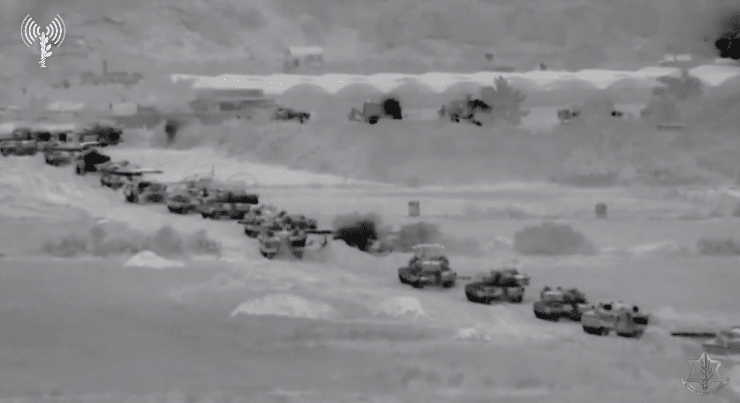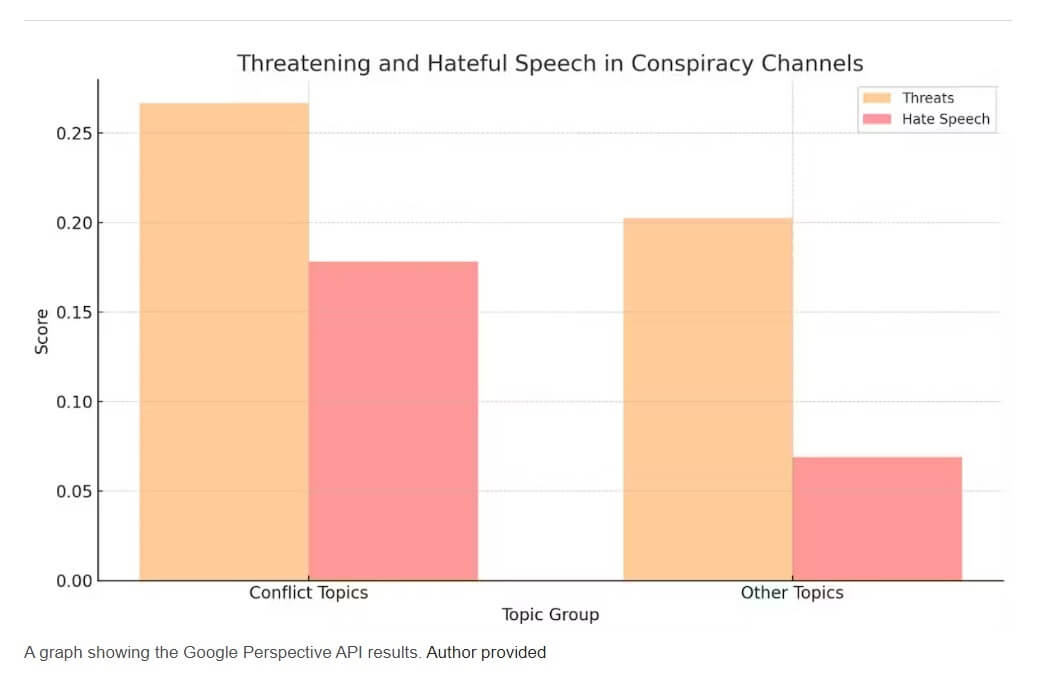An Australian researcher who monitors expressions of hate on social networks analyzed about 12 thousand comments, and who do they think is to blame for every trouble in the world? That's right, the globalist Jews
By Nicholas Evans, Lecturer in Policy and Emergency Management, University of Tasmania

As the war between Israel and Hamas in Gaza heated up, conspiracy theories and misleading information about the conflict spread more and more on social media.
At least that's what I found in my analysis of about 12,000 comments posted on Telegram channels following the Hamas attack on Israel on October 7. Not surprisingly, I also found that the language in which they commented on the war tended to be more threatening or hateful than the language in which they commented on other issues.
Many of the responses on Telegram also linked the conflict between Israel and Hamas to dangerous anti-Semitic conspiracy theories also related to the war between Russia and Ukraine, hundreds of kilometers away, on another continent.
For example, I found that the Russian invasion of Ukraine was described by conspiracy theorists as a justified resistance against the "return mafia" (the "fake" Jews), who supposedly rule Ukraine as Nazis or like them. Comments on Telegram described the October 7 attack by Hamas in similar terms - as an attack against "fake Zionist Ashkenazi Jews" and Nazis.
Both conflicts have also been described as programs of the "New World Order". Proponents of these theories believe that powerful elites (sometimes described as Jews) are secretly trying to establish a totalitarian world government or other forms of global oppression.
A comment on one of the channels summed up this point of view and claimed "These globalists are bad, starting a second psychological front [psychological operation] after failing in Ukraine".
Other reactions linked the two conflicts by calling the supporters of the West in Ukraine hypocrites for condemning the actions of Hamas. As one user claimed: "The weapons of the West in Ukraine [were] sent to Hamas for an attack."
Many of these conspiracy theories are not new in themselves. However, what is unique about this situation is the way people linked two essentially unrelated conflicts through conspiracy theories.
The study showed that overlapping crises (sometimes called "polycrisis") may accelerate the spread of conspiracies, possibly due to the mental burden resulting from constantly dealing with rapid changes.
When crises overlap, such as wars and global epidemics, this overlap can also amplify the effects of conspiracies. For example, the amount of prejudice and extremism seen online may increase. In extreme cases, people can also act on their beliefs.
Although these theories appear on the fringes of social networks, it is still important to understand how this type of rhetoric can develop and be harmful if it penetrates the mainstream media or politics.
How did I do my research?
I monitor a number of Australian public Telegram channels as part of a wider project examining the interface between conspiracy theories and security. For the final phase of this research, which has not yet been peer-reviewed, I analyzed 12,000 comments posted on three of these channels between October 8 and 11, 2023.
To analyze so many messages, I used the method of topic sampling. It is a statistical model that can identify recurring themes within large amounts of text-based data. Basically, topic sampling is similar to highlighting parts of a book that contain related topics.
There are many approaches to sampling subjects. I used BERTopic, which generates topics by "associating" posts with similar features, such as words, sentences, and other parts of context. In total, I identified 40 different themes in the responses I analyzed.
I then divided these topics into conflict and non-confrontational groups to analyze the emotion behind them. To do this, I used Google's Perspective API algorithm, which can score text on a zero-to-one scale for hateful or threatening language. The results show that posts about confrontational topics were more likely to include threatening and hateful language.

The main reason for this is the anti-Semitic nature of the most common conflict group (keywords: "Israel", "Jew", "Hamas", "Zionist", "Palestinian"). One representative response from this group, for example, called for the abolition of Israel as a state.
I also found Islamophobic posts in this thread. For example, some comments suggested that Hamas actions reflect Islamic beliefs or demonstrate the danger of Muslims in general.
The second largest topic (keywords: "Ukraine", "Russia", "Putin", "war", "Islam", "propaganda"), documented discussions linking the attacks by Hamas to the war between Russia and Ukraine. The messages did this by presenting both conflicts as justified on similar grounds (struggle against Nazis and imaginary Zionists), or by linking them to global conspiracies.
In addition, I also found variations of the "New World Order" global conspiracy theory on other topics. For example, the fourth largest topic (keywords: “video”, “clown”, “fake”, “film”, “staged”) included responses accusing Israel and other targets of other common conspiracy theories of staging Hamas attacks.
This aligns closely with themes on the Russia-Ukraine war from my wider project. One of the most frequently discussed topics (keywords: "Putin", "war", "Nazi", "Ukraine", "Jew") betrays Ukraine's defensive efforts as a sinister conspiracy, and usually involves Jewish figures such as the president of Ukraine.
As noted, the conspiratorial nature of social media, in addition to crises occurring at the same time may increase the levels of prejudice and radicalization of people.
Australia's security institutions have already warned of this risk during the ongoing war between Israel and Hamas. Director General of ASIO, Mike Burgess, warned of "spontaneous violence" arising from "language that raises tensions".
The study also showed a strong connection between conspiracies and anti-Semitism, which presents clear risks to Jews. Indeed, anti-Semitism reached unprecedented levels in the United States in 2021 and 2022, possibly due to the series of overlapping crises the world was experiencing at the time.
Dealing with conspiracy theories online is an important but challenging task. Effective countermeasures include a combination of proactive and reactive approaches that target both purveyors and consumers of conspiracies.
These approaches include increasing investment in education, reducing social inequality, and rigorously debunking conspiracy theories when they appear. Acknowledging the dynamics and proliferation of conspiracy narratives is the necessary initial step.
For the article in THE CONVERSATION
More of the topic in Hayadan:
- in the name of Allah
- How do the 'laws of war' apply to the conflict between Israel and Hamas
- How did Israeli intelligence miss Hamas' preparations for an attack? An American counter-terrorism expert explains how Israeli intelligence works
- The spread of the corona virus - a breeding ground for conspiracy theories. Why is it dangerous?

One response
The most important words in the article appear at the end:
"Effective combat strategies include a combination of proactive and reactive approaches that target both suppliers and consumers of conspiracies. These approaches include increasing investment in education, reducing social inequality, and rigorously refuting conspiracy theories when they appear.”
But what do you do when you are ideologically committed to the flattening of education and the deepening of inequality, and you yourself spew conspiracy theories every day? How do you fight conspiracies directed at you?